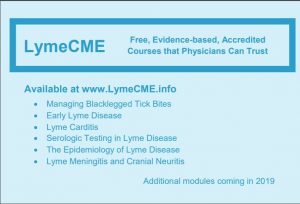Postcard Project helps alert doctors to LymeCME opportunitites

by Dr. Elizabeth Maloney
Most, if not all in the Lyme community know these statements to be true:
*Many aspects of Lyme disease, especially the diagnosis and treatment of disseminated and persistent (chronic) disease, are controversial.
*Early diagnosis and treatment of the infection leads to better outcomes compared to instances where treatment is delayed.
*Too many doctors lack the requisite knowledge and skills to properly diagnose and treat patients with Lyme and other tick-borne diseases.
One of the Lyme community’s primary goals is to prevent the long-term consequences of Lyme disease. Thus, providing education to those who need it most should be a priority. Most people with a tick-borne disease (TBD) are first seen by a primary/urgent care doctor or another healthcare provider. Therefore, it is crucial to educate these medical professionals about the basic facts pertaining to this group of infections. This will help ensure that they are prepared to meet the needs of the patients who seek their care.
For many years, medical education regarding tick-borne infections was often superficial and not representative of the medical evidence. Thus, it was poorly suited to meet the needs of patients and their doctors. LymeCME is out to change that.
LymeCME
The origins of LymeCME date back to 2006, when I realized that we lacked community-based TBD education for primary care doctors. To fill that void, I researched and developed a full-day seminar on Lyme disease and related tick-borne illnesses that I could bring to communities where there was a desire for meaningful physician education.
For several years, I was content doing just that. However, things changed after I met with the CEO of a northern Minnesota hospital. During our conversation, he noted several reasons why physicians who treat a wide spectrum of patients (not just patients with a TBD) might not be interested in attending a full-day seminar. Hence, the birth of LymeCME.
LymeCME provides accredited, evidence-based, continuing medical education modules on tick-borne illnesses that fill in important educational gaps. Packaging the information into shorter, stand-alone presentations and having them available online 24/7 makes learning as convenient as possible. Former and current users appreciate the content and convenience and almost all have said they would recommend it to their colleagues. That’s great, but it’s a very slow way to build awareness.
Help us reach primary care doctors
The Postcard Project is designed to spread the word about LymeCME in order to accelerate physician (and other medical professionals) participation. An upbeat invitation from a patient or someone a doctor knows is likely to command more attention than a bulk mailing.

Personalize it by adding a quick, upbeat note encouraging them to check out the different offerings. Support groups might enjoy hosting a “postcard party,” so members can socialize while they’re working.
If you have questions or ideas about the Postcard Project, please contact info@partnershipfortick-bornediseaseseducation.org. You can use the same address to send along other ideas you may have for increasing awareness and use of LymeCME.
Thanks, and best wishes for good health.
Dr. Elizabeth Maloney is President of Partnership for Tick-borne Diseases Education, a 501(c) that provides educational resources to medical professionals and the public. She lives in a high Lyme area of Minnesota.




















We invite you to comment on our Facebook page.
Visit LymeDisease.org Facebook Page